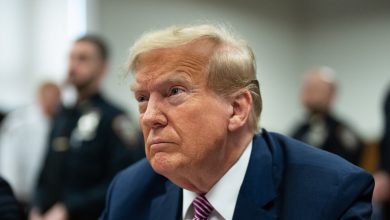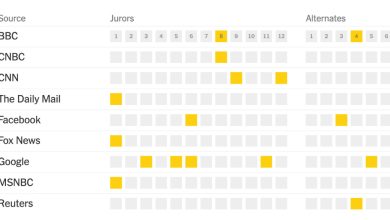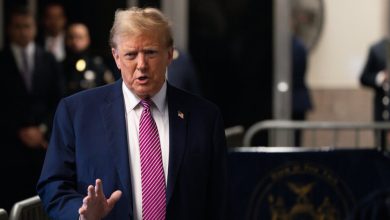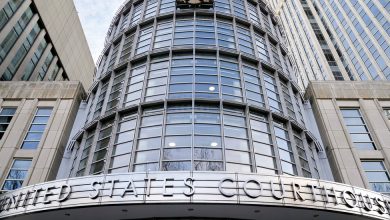U.S. Manages Expectations of a Breakthrough Before Biden and Xi Meet
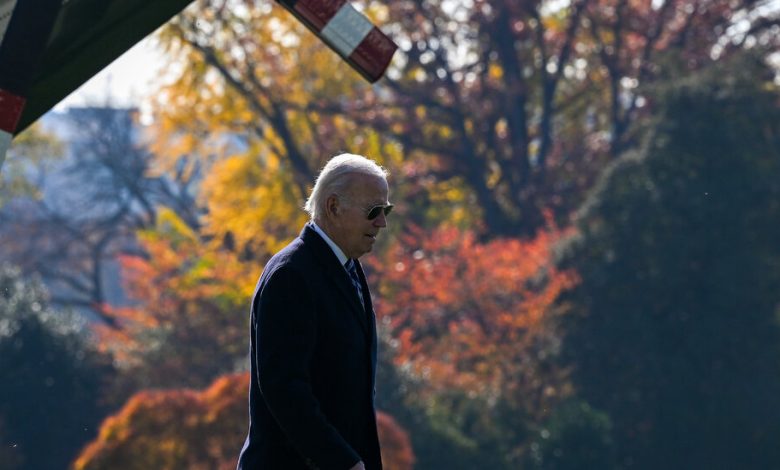
Of all the issues dividing the United States and China — spy balloons, Beijing’s rapid nuclear buildup and Washington’s crackdown on advanced computer chips — the White House has been engaged in one more topic of debate: what China’s leader will see when he looks out of his window during his visit to California this week.
When President Biden meets with President Xi Jinping on Wednesday, China’s diplomats want to know what Mr. Xi will be looking at, and to make sure the scenery does not include protesters. Nearly every minute they spend together, from the number of steps it will take Mr. Xi to reach a chair when he enters a room to the specific timing of their handshake, will be part of a highly choreographed diplomatic dance, one designed to give them the space to try to defuse a year of bubbling tensions.
The ceremonial details have now been hashed out. But compared with the U.S.-China summits of a decade ago or more, the expectations for substantive agreement are minimal, at best.
Mr. Biden’s advisers have hinted at only one concrete agreement expected to emerge from the meeting, which is scheduled to be held near the end of the Asia-Pacific Economic Cooperation summit, called APEC, in San Francisco. The leaders, they said, could announce a resumption of military-to-military communications, which were suspended by the Chinese after Nancy Pelosi visited Taiwan in the summer of 2022.
And both sides have been discussing whether they could find a way to a future commitment to keep artificial intelligence software out of their nuclear command and control systems. While that might seem to be a pretty straightforward discussion, until now China has never entered a significant negotiation about its fast-expanding nuclear arsenal, so even the first wedge into the issue could prove significant.
Yet the fact that the bar is this low is telling. American officials say there is no plan for the two leaders to issue a joint statement of any kind. Instead, each government will provide its own account of the discussions.
There was a time when summits with Chinese leaders resulted in agreements on containing North Korea and keeping Iran from getting a nuclear weapon, on climate goals and economic coordination to avoid financial crises and joint efforts in counterterrorism. Those days are over. While Mr. Biden plans to address China’s continued shipment of technology to Russia to feed the war in Ukraine, and its purchases of sanctioned Russian and Iranian oil, there is little to no prospect of changed behavior, officials acknowledge.
The summit is set to be the first time Mr. Biden and Mr. Xi have talked in a year, and Mr. Xi’s first visit to American soil since 2017. In their carefully crafted description of their expectations, Mr. Biden’s advisers have refrained from repeating their past wish to put “guardrails” in the relationship — a phrase the Chinese reject as a new American style of containment — or to place a “floor” underneath a relationship that has spiraled downward.
In briefings to reporters, they have used phrases like being “cleareyed” and keeping “open lines of communication” to describe a relationship they believe is best managed not with “engagement” — the approach to China advocated for decades — but old-fashioned diplomacy.
Jake Sullivan, the president’s national security adviser, told reporters on Monday that the relationship is now about “managing competition responsibly so that it does not veer into conflict. The way we achieve that is through intense diplomacy,” Mr. Sullivan said. “That’s how we clear up misperceptions and avoid surprises.”
Chinese officials say Mr. Xi will seek assurances from Mr. Biden that the United States “does not seek a new Cold War,” the country’s ambassador to the United States, Xie Feng, said last week. But over the past year, Mr. Xi has made it clear that he considers the United States to be deep into Cold War-like behavior. “Western countries led by the United States have implemented all-around containment, encirclement and suppression of China,” he said in March.
Chief among China’s concerns has been the Biden administration’s efforts to build up a patchwork of old allies and new partners in the Indo-Pacific — with new accords from the Philippines to Papua New Guinea — to counter China’s ambitions.
“We know this because Chinese leadership complains frequently, and at high volume, about what it sees as a U.S. encirclement campaign,” said Jude Blanchette, a China scholar at the Center for Strategic and International Studies.
Mr. Xi’s visit to APEC, a group of 21 countries that surround the Pacific Ocean, Mr. Blanchette said, is an “effort to slow down or modify the pace and severity of future U.S. actions, especially in the technology space, that it sees as costly.”
Both men will be feeling each other out about a potential conflict over Taiwan. Six months ago, American officials were regularly conducting tabletop exercises about how they might respond to an attack, or strangulating squeeze, of the island.
There is still concern, but American officials are now signaling that they believe China’s economic slowdown has bought some time, with Mr. Xi in a poor position to risk broad economic sanctions. And in recent talks with American officials, Chinese diplomats have sounded more worried about the coming elections in Taiwan — fearful that if the election fueled a move toward independence, China might be forced to act.
Analysts say Chinese officials, for their part, have intently watched American political discord from afar. Republicans have assailed Mr. Biden for seeking to stabilize the relationship with China, though until the Covid pandemic that was exactly what President Donald J. Trump said he was trying to do, as he pursued trade deals. .
A letter sent to the White House on Wednesday by a House select committee on China called on Mr. Biden to challenge Mr. Xi on several points of tension, including the wrongful detention of Americans, existing regulations on fentanyl production and recent near collisions between Chinese and American ships and warplanes.
Administration officials have largely avoided detailing how Mr. Biden plans to bring up those issues with Mr. Xi, but said the president would address other concerns, including noninterference in the election in Taiwan.
The administration has also said very little about how Mr. Biden plans to raise the issue of China’s rapid nuclear buildup. The Pentagon reported recently that the Chinese arsenal had hit 500 strategic weapons, and it expects that figure to double by 2030. But the current number of Chinese deployed weapons is still a third of the size of the American and Russian arsenals, and Chinese officials have told their American counterparts they will not discuss arms control until they have parity with the other two nuclear superpowers. The artificial intelligence discussion may be the best way into a broader nuclear discussion, experts say.
Mr. Biden is also expected to broach the war in Gaza with Mr. Xi, Mr. Sullivan said. Beijing has a warm trade and diplomatic relationship with Iran, a country that helps support Hamas and other militant groups in the Middle East. Mr. Biden is expected to stress to Mr. Xi that an expanded war in the Middle East “is not in the interests of the P.R.C.,” using an acronym for the Chinese government, and that the United States will respond if Iranian proxies continue to attack American forces.
The meeting will take place a year after Mr. Biden and Mr. Xi met and tried to strike a warmer tone during the Group of 20 summit in Bali, Indonesia, another rigidly planned affair.
(Mr. Xi’s aides have good reason to worry about the details of a meeting with an American president: In a 2006 visit to the White House, President Hu Jintao’s speech at a welcoming ceremony on the South Lawn was interrupted by a protester, and it took several minutes for security officials to reach her and escort her out. At the same event, China’s anthem was announced as the anthem of the “Republic of China” — the formal name for Taiwan. Mr. Hu’s party considered leaving Washington.)
Mr. Biden’s advisers are going into the Wednesday meeting betting that the Chinese have been surprised by efforts to develop allies across the Indo-Pacific and build stronger diplomatic accords with other leaders. That includes President Narendra Modi of India, whose country has been a target of Chinese aggression at its borders and who was the guest of honor during a White House state visit in June.
In September, Mr. Biden met with Mr. Modi again in India, and then traveled to Vietnam to announce a new strategic partnership. On Monday, Mr. Biden hosted Joko Widodo, the president of Indonesia, at the White House, where both leaders announced that Indonesia is elevating its relationship with the United States to its highest level.
Kurt Campbell, the president’s coordinator for Indo-Pacific Affairs and nominee for deputy secretary of state, said in an interview with the Atlantic Council that the most important thing for the United States to do during the summit would be to “make clear and to demonstrate to the Chinese that we still have staying power, that we are still the most powerful country, and we are still committed to our larger purpose in the Indo-Pacific.”
Outside of the meeting with Mr. Biden, Mr. Xi is expected to focus much of his time in California on showing leaders of American industry that his country is open for business. After he and Mr. Biden meet, Mr. Xi is expected to speak to top American business executives at a $2,000-a-plate dinner, part of a “C.E.O. Summit” on the sidelines of the main event.
Mr. Biden is expected to attend another event, according to officials.

